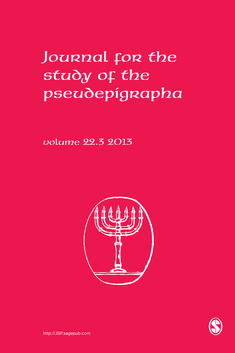
Journal for the Study of the Pseudepigrapha
metrics 2024
Advancing Scholarship in Religious Literature
Introduction
The Journal for the Study of the Pseudepigrapha, published by SAGE Publications Ltd, is an esteemed periodical dedicated to advancing the scholarly exploration of pseudepigraphal literature and its impact on religious studies. With an ISSN of 0951-8207 and E-ISSN 1745-5286, this journal provides a vital platform for researchers, professionals, and students alike who seek to deepen their understanding of the diverse literary and theological dimensions of pseudepigrapha. Operating from the United Kingdom, the journal's output spans from 1987 to 2024, ensuring a rich archive of insights and discussions relevant to contemporary debates within the field. It currently holds a categorization in the fourth quartile of Religious Studies (Q4) and ranks 308 out of 644 in the Scopus database, highlighting its established presence among a growing community of scholars. The journal does not currently offer Open Access, though its content remains highly valuable for those engaged in the investigation of ancient texts beyond the canonical scriptures. By fostering rigorous analysis and multifaceted discourse, the Journal for the Study of the Pseudepigrapha continues to make significant contributions to the understanding of identity, tradition, and textual interpretation within various cultural contexts.
Metrics 2024
 0.10
0.10 0.40
0.40 0.60
0.60 15
15Metrics History
Rank 2024
Scopus
JCI (Web Of Science)
Quartile History
Similar Journals
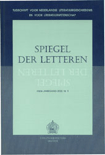
SPIEGEL DER LETTEREN
Unveiling the Rich Tapestry of Literary DiscourseWelcome to SPIEGEL DER LETTEREN, a distinguished journal published by PEETERS in Belgium, with an impressive Q1 ranking in Literature and Literary Theory. Since its inception in 1996, this journal has been at the forefront of literary scholarship, engaging researchers, professionals, and students in profound discussions and analysis of literary texts, theories, and cultural contexts. Although it does not currently offer open access, its rigorous editorial standards ensure that each published work contributes significantly to the field, promoting the advancement of knowledge and understanding in literature. With an established reputation, SPIEGEL DER LETTEREN serves as a vital resource for those seeking to explore the nuances of literary studies, supported by a diverse range of articles that reflect both contemporary and historical perspectives.
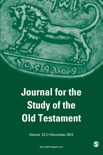
Journal for the Study of the Old Testament
Connecting Theology with Historical ContextJournal for the Study of the Old Testament, published by SAGE PUBLICATIONS LTD, is a preeminent peer-reviewed journal dedicated to advancing the field of religious studies, particularly the scholarly investigation of the Old Testament. With its ISSN of 0309-0892 and E-ISSN 1476-6728, the journal has been a vital resource for researchers since its inception in 1976 and continues to deliver cutting-edge scholarship through 2024. Renowned for its rigorous academic standards, the journal has achieved a prestigious Q1 ranking in Religious Studies, positioning it among the top quartile of academic journals in this field. It holds a commendable 75th percentile ranking in the Scopus database, highlighting its impact and relevance in contemporary discourse. Addressed from its United Kingdom base at 1 Olivers Yard, 55 City Road, London EC1Y 1SP, the journal features a comprehensive exploration of theological themes, literary analyses, and historical contexts, aimed at researchers, professionals, and students alike. While access options may vary, the journal remains an indispensable platform for fostering scholarly dialogue and disseminating innovative ideas within the discipline.

Bulletin of the John Rylands Library
Fostering Insight into Library Evolution and ImpactBulletin of the John Rylands Library is a prominent academic journal published by MANCHESTER UNIVERSITY PRESS that serves as a vital platform for research in the fields of Arts and Humanities and Library and Information Sciences. Since its inception, the journal has contributed to the scholarly discourse surrounding library practices, archiving, and historical studies, making it essential reading for researchers, professionals, and students alike. With an ISSN of 2054-9318 and an E-ISSN of 2054-9326, it offers a rich repository of knowledge, although steeped in a diverse array of subjects, it currently holds a Q4 quartile ranking, reflecting its niche but significant impact within its categories. The journal has undergone various published years, most recently from 2014 to 2023, encompassing thematic articles that bridge theoretical and practical realms. While primarily a subscription-based resource, its authoritative contributions are invaluable for anyone engaged in understanding the evolution of libraries and their impact on society. The Bulletin significantly enhances academic engagement, fostering a deeper appreciation for the interconnectedness of library science and the broader humanities.

De Medio Aevo
Connecting Past Narratives with Contemporary DiscourseDe Medio Aevo is a distinguished academic journal published by UNIV COMPLUTENSE MADRID, SERVICIO PUBLICACIONES, dedicated to enriching the fields of Cultural Studies, History, Literature and Literary Theory, Philosophy, Religious Studies, and Visual Arts and Performing Arts. Since its inception in 2012 as an Open Access platform, this Spanish journal has rapidly established its reputation, achieving impressive rankings in various categories with a Q1 classification in Literature and Literary Theory and notable positions in Q2 across other fields as per the 2023 metrics. With an emphasis on rigorous scholarly research, De Medio Aevo seeks to foster the exchange of ideas and insights that reflect the rich tapestry of medieval studies and its ongoing impact on contemporary society. It is an essential resource for researchers, professionals, and students alike, encouraging interdisciplinary dialogue and exploration of the cultural narratives that shape our understanding of history and the arts. Located in Madrid, Spain, the journal is committed to making significant contributions to its fields, with a global reach and a focus on academic excellence.
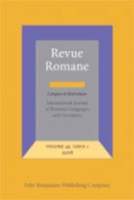
REVUE ROMANE
Unveiling the Interplay of Words and WorldsREVUE ROMANE is a prestigious academic journal published by John Benjamins Publishing Co, located in the Netherlands. With a rich heritage dating from 1996 to 2024, this esteemed journal focuses on the dynamic interplay of *Linguistics* and *Literature*, making it an essential resource for scholars, researchers, and students alike. By showcasing a range of theoretical and empirical studies, the journal has positioned itself in the Q3 and Q2 quartiles for *Linguistics and Language* and *Literature and Literary Theory* respectively, reflecting its significant impact on these fields. With impressive Scopus rankings, including a notable 79th percentile in Arts and Humanities within Literature and Literary Theory, REVUE ROMANE serves as a critical platform for the exploration of both language and literary expressions, encouraging dialogues that bridge cultural and linguistic divides. Although it is not open access, its contributions are invaluable for advancing knowledge and fostering scholarly discourse in the realms of linguistic and literary investigation.

Novyi Filologicheskii Vestnik-New Philological Bulletin
Bridging Local Insights with Global ScholarshipNovyi Filologicheskii Vestnik-New Philological Bulletin is a distinguished academic journal published by the Russian State University for the Humanities, devoted to the interdisciplinary study of linguistics, literature, and philology. With its ISSN 2072-9316, this journal serves as an essential platform for scholars, researchers, and students aiming to explore the depths of philological research and its applications. Although currently operating under a traditional access model, the journal emphasizes accessibility and engagement with advancements in linguistic theory and literary analysis, reflecting the evolving landscape of philological studies. The bulletin is dedicated to fostering academic discourse by publishing original research, critical essays, and comprehensive reviews, thereby contributing significantly to the advancement of knowledge and understanding in the field. Set in the heart of Moscow, the journal aims to bridge local and global scholarship, inviting contributions that showcase innovative methodologies and theoretical frameworks. Overall, Novyi Filologicheskii Vestnik-New Philological Bulletin stands as a vital resource for anyone interested in contemporary developments in philology and related disciplines.
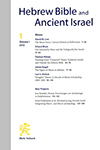
Hebrew Bible and Ancient Israel
Advancing Biblical Scholarship Through Interdisciplinary Insights.Hebrew Bible and Ancient Israel is a premier scholarly journal published by MOHR SIEBECK, renowned for its rigorous contributions to the fields of biblical studies, ancient history, and archaeology. With its ISSN 2192-2276 and E-ISSN 2192-2284, this journal serves as a vital platform for researchers, professionals, and students interested in the historical and cultural contexts of the Hebrew Bible and its impact on ancient Israelite society. Although it does not currently offer an open access model, the journal is committed to disseminating critical research findings that enhance our understanding of ancient texts and their relevance to contemporary discussions. Situated in the scholarly landscape, Hebrew Bible and Ancient Israel not only strives to illuminate the complexities of biblical narratives but also engages with interdisciplinary approaches that enrich the study of ancient civilizations. Its publication out of Tübingen, Germany, further cements its role as a significant contributor to international academic discourse.

Journal for the Study of Judaism
Advancing Scholarship in Jewish StudiesJournal for the Study of Judaism, published by BRILL, serves as a vital platform for scholarly discourse in the fields of History, Literature and Literary Theory, and Religious Studies. With a commendable impact factor and ranking in the Q2 and Q3 quartiles across its respective categories, this journal facilitates high-quality research that explores the multi-faceted dimensions of Jewish studies from its inception in 1970 to the present day. For those who engage with the journal, the commitment to rigorous peer-review processes ensures publication of significant articles that advance knowledge and foster discussions within the academic community. As an essential resource for researchers, professionals, and students alike, the journal continues to enrich the understanding of Judaism through esteemed contributions of scholarship and critical analysis. The journal’s rich legacy and commitment to excellence make it an indispensable tool for those seeking to deepen their insight into Jewish studies and its broader implications.

E-Scrita-Revista do Curso de Letras da UNIABEU
Connecting Scholars and Students in Literary ExplorationE-Scrita - Revista do Curso de Letras da UNIABEU is a distinguished open-access journal dedicated to the field of Linguistics and Literature, published by CENTRO UNIV UNIABEU. Since its inception in 2010, this journal has provided a platform for the dissemination of innovative research and scholarly articles, particularly focusing on the Portuguese language and literature. With its location in Nilópolis, Rio de Janeiro, Brazil, E-Scrita serves as a vital resource for researchers, professionals, and students eager to engage with contemporary issues and advances in the study of linguistics, literary theory, and cultural studies. The journal is committed to promoting academic dialogue and fostering a deeper understanding of literary practices and linguistic phenomena, making it an essential reading for anyone involved in the humanities.

Forum for World Literature Studies
Cultivating Critical Thought in Cultural StudiesForum for World Literature Studies, published by KNOWLEDGE HUB PUBL CO LTD, stands as a pivotal platform within the humanities, particularly in the realms of Cultural Studies and Literature and Literary Theory. Established in 2009, this academic journal has quickly ascended to a prestigious Q1 ranking as of 2023, reflecting its significant impact in advancing scholarly discourse. With an impressive Scopus ranking—165th out of 1106 in Literature and Literary Theory, and 548th out of 1304 in Cultural Studies—it offers a critical space for researchers, professionals, and students dedicated to exploring the relationships between literature and cultural phenomena. Operating out of Hong Kong, the journal provides a rich selection of peer-reviewed articles that delve into global literary trends, making it an essential resource for anyone wishing to contribute to or deepen their understanding of world literature. With the prospect of open access options enhancing its accessibility, the Forum for World Literature Studies invites submissions that challenge conventional interpretations and foster innovative thinking in literary studies.